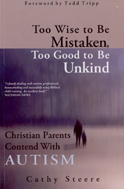Too Wise to Be Mistaken, Too Good to Be Unkind: Christian Parents Contend with Autism by Cathy Steere

by Kathy Kuhl
Cathy Steere has written an excellent memoir of the first five years of her son Drew’s life with autism. She describes his symptoms, his strengths, and the emotional roller-coaster ride of parents trying to understand and help a child trapped by what she calls “the monster,” autism. She recounts their search for answers and the neurodevelopmental treatment plan they eventually tried. She tells how faith in an all-wise and all-powerful God and an understanding of human nature equip her husband and her to endure and to teach this unusual child.

This book captures the parents’ struggle. First, the growing awareness of a problem: the Steeres saw their son shun their hugs and avoid eye contact, prefer ceiling fans to his parents’ faces. Cathy Steere portrays her fears, self-pity, depression, and grief, as well as their courage, persistence, and patience. She writes about dealing with what others think of your child, of what to say and when. If you don’t care to read about the emotions of raising a child with a disability, skip this book. But if you’ve struggled to understand the needs of a child with any special needs, you might find echoes of your own journey.
Particularly interesting to me was the detailed description of the grueling work these parents in a program of neurodevelopmental therapy, which in their son’s case had extraordinary results. The parents provided hours of therapy at home daily, helping Drew become accustomed to different sounds, textures, and movements, under the guidance of a therapist.
Distinctive
This memoir on autism is also distinctive in the Steeres’ convictions about God. They believe that even though God allows some people to be born with disabilities, God is still good. God has a good purpose behind his actions, whether we see it or not. If you are struggling with why a good God would allow your child to be born with disabilities, I recommend this book.
The author also believes that people, from birth, have a tendency to selfishness and disobedience, so parents must discipline children with firm, kind consistency. Parents should do their best to understand their children’s condition and limits, but a disability is no excuse for a child to disobey willfully. Parents will sometimes err in discipline. (Haven’t we all?) But teaching obedience builds self-control, which our children need to accomplish anything.
Several times, Cathy Steere describes a course of discipline, then says they applied it consistently, and—in a year or so—saw results. This is a good example for anyone training children who take longer than average to respond to correction. Drew’s doctors regularly were astounded by his good behavior, considering the extent of his autism. A severe case like the Steere’s child shows the benefits of consistent, compassionate discipline.
Why read Cathy Steere’s Too Wise To Be Mistaken, Too Good To Be Unkind? Read it to walk with other parents through the process of development, struggle, diagnosis, and treatment. Read it to see an example of neurodevelopmental training in action. Read it for a Biblical perspective on children with special needs.
Want to know more? See below:
Click here to learn more or to purchase Too Wise to Be Mistaken, Too Good to Be Unkind.

